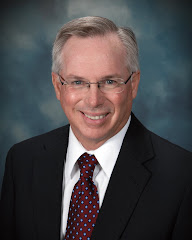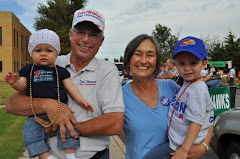Legislature Adjourns
The Kansas legislature concluded the 2011 session in May, adjourning on the 90th day of a scheduled 90-day session. Never mind that we actually left the building on the 91st day! Thursday May 12 was the 90th day, and both the House and Senate “pulled an all-nighter” and worked through the night to finish up work. The House was the last to adjourn, at 6:03 a.m. on Friday. But since the Thursday session was never adjourned, legislative logic is that we were still in the 90th day.
As in recent years, the most important piece of legislation produced was the budget for the coming year. The Legislature was facing a $500 million shortfall when the session began in January, and the when the final budget compromise was reached in May it had a $50 million positive ending balance. The final budget passed the Senate 28-11 and the House 69-55. I was among those who voted yes. Certainly there were some items in the budget that I didn’t agree with, but that will always be true, and in the end a budget must be passed. I believe the budget we produced is very close to the best we could possibly achieve given the difficult fiscal situation currently facing Kansas government. Some of the budget highlights include:
- Reducing the 2012 Legislative Session to 80 days from the regular 90 days
- Restoring funding to Washburn University, which had been cut in half in the House budget plan
- Cut KAN-Ed funding by $4 million and require a post-audit and interim study to map out a future plan for the program
- Allowing for the continued operation of the Kansas Neurological Institute (KNI)
- Funding the Kansas Arts Commission (this funding was later vetoed by Governor Brownback)
- Providing nearly flat funding for Kansas colleges and universities
- Preserved funding for Early Childhood Education
- Funding K-12 education at $3,780 for Base State Aid per pupil, which is the lowest funding level in a decade
The good news is that since the budget was adopted, state tax receipts have continued to exceed expectations. For the fiscal year ended June 30, state tax receipts for the year were $87.6 million above projections. This means a larger beginning balance heading into fiscal year 2012, and possibly a little more “wriggle room” in what will likely be another tight budget year next year. Here are additional highlights from the 2011 session:
Redistricting
Now that the results of the 2010 federal census are complete, the Kansas legislature will use that data to redraw boundaries for Kansas’ four U.S. Congressional districts, State Senate and House districts, and state Board of Education districts. This must be done to insure that the federal mandate of equal representation is preserved. Here is a look at the process and timeline for accomplishing the task:
The census results show that Kansas population continues to shift from rural areas to the urban centers of the state. That is bound to mean less representation for rural Kansas, but the way the district boundaries are drawn can amplify or diminish that effect to some extent. For the 118th District, preliminary numbers show that the district must be expanded geographically. At the present time the district is nearly 4000 residents short of the required number. Here is a look at the population changes by county from 2000 to 2010:
The Role of Government
Tough times bring tough decisions, and in his State of the State of address in January, Governor Brownback promised that his administration would be focused on getting state government back to providing the core functions of government. Few can argue with the necessity of doing just that, and the process is ongoing at both the state and federal level.
As that process continues, some programs supported by state government will be forced to turn elsewhere for funding. Arts and public broadcasting are just two examples. Though the legislature included funding for the Kansas Arts Commission in the budget, Governor Brownback line-item vetoed that funding, and insisted that the arts in Kansas must be funded privately. Similarly, support for public broadcasting was cut in half in the 2012 budget, and Governor Brownback has pledged that this will be the final year of state funding.
The problem is that as in so many other instances, when funding is cut the effect is felt in rural Kansas to a greater extent than in the cities. With no state funding, the arts in Topeka or Johnson County will likely continue to thrive. But it will be quite difficult for small towns to replace the state funding they received for arts programs. Similarly, High Plains Public Radio and Smoky Hills Public Television have historically depended on state funding to a greater extent than their urban counterparts, due to the large geographic area and sparse listener base they serve. In their most recent budget, both entities depended on state funding for approximately 25% of their funding.
It is hard to argue that programs such as these are “core functions of government”, but it is also apparent that they have great value in improving quality of life for many Kansans, and for making Kansas a more attractive place to prospective future residents. But given the current budget realities, the future existence of the arts and public broadcasting will depend on the heightened support of those Kansans who find value in them. If you want to see these programs continue, I encourage you to consider increasing your level of support. Write a check to your local arts council, or make a contribution to High Plains Public Radio or Smoky Hills Public Television.
Global Economy
The Kansas economy is increasingly focused on, and dependent on, the global market. Business Roundtable recently reported that 10.2% of the Kansas Gross Domestic Product in 2008 was based on export activity. Leading export products from Kansas include transportation equipment, crop production, processed foods, machinery, and computers/electronics.
Representative Don Hineman awarded fellowship for
Midwestern leadership institute
(Lombard, Ill.) May 2, 2011 – State Representative Don Hineman of Dighton, Kansas was among 37 select lawmakers chosen to participate in a training program that annually identifies and assists promising state leaders in the Midwest.
Representative Hineman will meet with fellow lawmakers from Kansas and 10 other Midwestern states and the Canadian provinces of Alberta, Manitoba and Saskatchewan on August 12-16 in Madison, Wisconsin for the Council of State Government’s 17th Annual Bowhay Institute for Legislative Leadership Development.
Note – The above press release announced my participation in an upcoming leadership training institute. I am pleased to have been selected, along with my colleagues Representative Sean Gatewood (D – Topeka) and Senator Jeff Longbine (R – Emporia).
Other Honors and Recognitions
I have also been selected as one of a handful of legislators to participate in the Kansas Health Institute’s Legislative Academy, designed to explore current health issues. Our first meeting was in mid-December and we next met in early June. Two additional sessions will be held in September and November before the legislature next convenes in January 2012.
In late April I was notified by Speaker Mike O’Neal that I have been appointed to the 2011-2012 “legislative travel squad”, and that I will serve on the Energy Committee of the Council of State Governments’ Midwestern Conference.
Hineman Files for Re-Election
Before I left Topeka in May I stopped by the office of the Secretary of State and filed for re-election to the Kansas House of Representatives. With declining rural population, the need for strong leadership for rural Kansas is greater than ever. Redistricting will result in an even larger District 118 geographically. It is also possible that the district lines could be drawn such that I am no longer in the 118th district, but in a neighboring district. Those issues are yet to be determined, but for now I am ready and willing to serve, regardless of what district I live in come election time in 2012.
Cowboy Logic: Money can't buy happiness, but neither can poverty.
Quote of the Week: A lot of people mistake a short memory for a clear conscience. – Doug Larson
Sermon in a Sentence: To forgive is to set a prisoner free and discover that the prisoner was you. – Louis B. Smedes





No comments:
Post a Comment